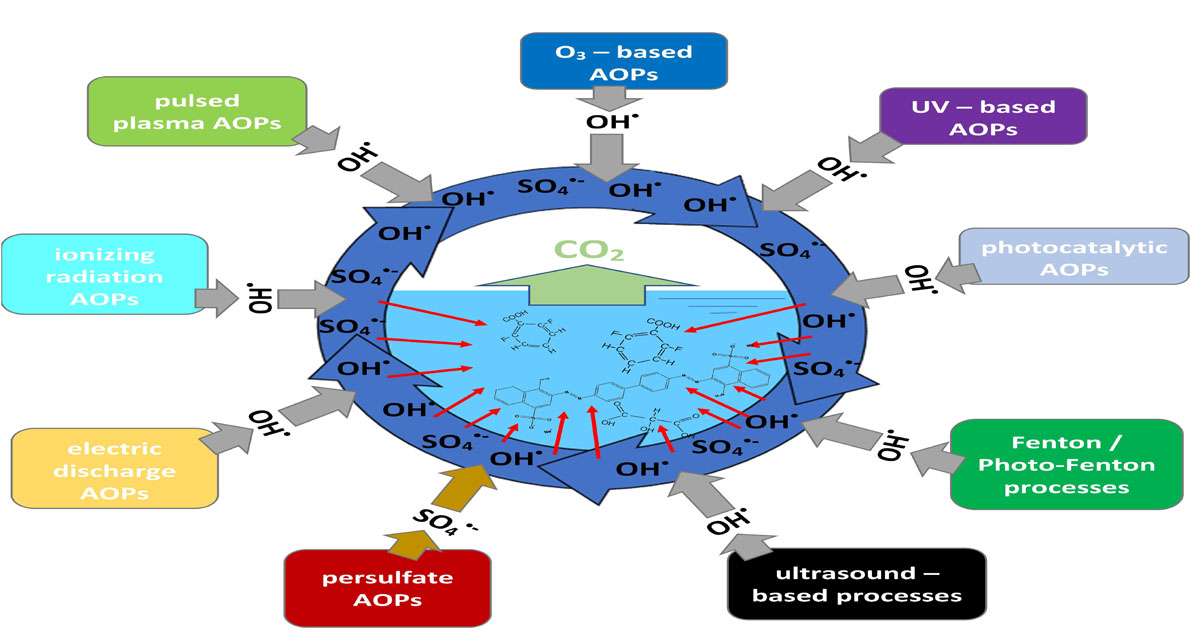- 2.5Impact Factor
- 5.5CiteScore
- 20 daysTime to First Decision
Advanced Oxidation Processes for Water Treatment
This special issue belongs to the section “Environmental Sciences“.
Special Issue Information
Dear Colleagues,
Since the 1980s we have been witnessing the advances in chemical/physical water and wastewater treatment processes termed advanced oxidation processes (AOPs). AOPs have shown great potential in treating pollutants in drinking water, wastewaters, industrial effluents etc., even they can be used as a disinfection technique. Simultaneously, water shortage is becoming increasingly serious problem in the world and very soon we will be in a need to reuse and reclaim wastewater besides releasing it without pollutants to natural environment. AOPs are processes that can be a solution for these requirements.
They are characterized, during the water treatment, by generation of hydroxyl radicals (OH·) or sulfate radicals (SO4·−) to remove different organic matters, traceable organic contaminants, emerging pollutants, inorganic pollutants, or to increase wastewater biodegradability. They can be used as an additional treatment step in existing wastewater treatment plants, but first we must increase their efficiency and cost-efficacy.
This Special Issue aims to present recent findings in the process of trying to increase the AOPs efficacy and to suite them to be used in real water/wastewater treatment plants.
Potential topics include but are not limited to:
- ozone based processes (with or without H2O2)
- UV-based processes (with or without H2O2)
- photocatalytic processes (UV or visible light driven)
- Fenton or Photo-Fenton processes
- ultrasound based processes
- persulfate oxidation processes (heat, UV, Fe(II))
- electric discharge processes
- ionizing radiation processes
- pulsed plasma processes
Prof. Dr. Davor Ljubas
Dr. Hrvoje Juretić
Guest Editors
Manuscript Submission Information
Manuscripts should be submitted online at www.mdpi.com by registering and logging in to this website. Once you are registered, click here to go to the submission form. Manuscripts can be submitted until the deadline. All submissions that pass pre-check are peer-reviewed. Accepted papers will be published continuously in the journal (as soon as accepted) and will be listed together on the special issue website. Research articles, review articles as well as short communications are invited. For planned papers, a title and short abstract (about 250 words) can be sent to the Editorial Office for assessment.
Submitted manuscripts should not have been published previously, nor be under consideration for publication elsewhere (except conference proceedings papers). All manuscripts are thoroughly refereed through a single-blind peer-review process. A guide for authors and other relevant information for submission of manuscripts is available on the Instructions for Authors page. Applied Sciences is an international peer-reviewed open access semimonthly journal published by MDPI.
Please visit the Instructions for Authors page before submitting a manuscript. The Article Processing Charge (APC) for publication in this open access journal is 2400 CHF (Swiss Francs). Submitted papers should be well formatted and use good English. Authors may use MDPI's English editing service prior to publication or during author revisions.
Keywords
- advanced oxidation processes
- hydroxyl radicals
- sulfate radicals
- chemical oxidation
- organic pollutants
- inorganic pollutants
- emerging contaminants
- wastewater

Benefits of Publishing in a Special Issue
- Ease of navigation: Grouping papers by topic helps scholars navigate broad scope journals more efficiently.
- Greater discoverability: Special Issues support the reach and impact of scientific research. Articles in Special Issues are more discoverable and cited more frequently.
- Expansion of research network: Special Issues facilitate connections among authors, fostering scientific collaborations.
- External promotion: Articles in Special Issues are often promoted through the journal's social media, increasing their visibility.
- e-Book format: Special Issues with more than 10 articles can be published as dedicated e-books, ensuring wide and rapid dissemination.

